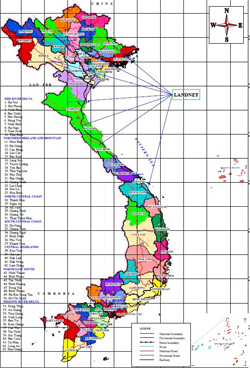Building on the positive work done with communities negatively affected by large scale developments in Vietnam, CIRUM has partnered with The Laws and Policy of Sustainable Development Research Center (LPSD, Vietnam), The Law and Development Partnership (LDP, Laos) and Focus on Global South (FGS, Thailand) to research adverse effects of investment projects in a Lao community and to build understanding on how to use the law to redress these negative impacts
With support from CCFD a leading French NGO, a regional workshop was held in Vietnam in mid- August with partners and representatives from both Laos and Vietnamese affected communities.
With 17 representatives from different organizations and communities attending the workshop, the exchange required translation across 4 different languages: Lao, Vietnamese, Thai, and English. Despite the language barrier, the participants have found a common language of sharing.
.jpg)
For community representatives’ their concerns regarding investment projects are very similar: loss of land has impacted negatively on their farming livelihoods and in many cases their access to spiritual practices on the land. Community members also discussed the difficulty in advocating to protect the rights and livelihood of affected people particularly when local officials do not support community; and the frequent threats from authorities to those who spoke out to protect people’s rights.
Partner organizations shared knowledge on Laos & Vietnamese law relating to the civil and land rights of the resettled people and policies on compensation and improvement of living conditions in the new resettled sites. Participants agreed that the legal documents of Laos and Vietnam are good, with provisions of the rights and benefits of the affected people. However, the implementation of law as well as the investor’s commitments have not brought real benefits to the affected people.
After nearly 4 days of discussion and exchange, the participants identified strategies in accordance with the local culture and living conditions: build connections and exchange among affected people, sharing policies, laws and commitment of investors with others via community cultural activities, such as festivals, labor exchange, collective cattle management, fruit and vegetable sales, and even small services.
To advocate to ensure investments in our region are sustainable and people-centred, partner organisations are developing a collective strategy to enhance their professional capacity and support communities according to their aspirations and in accordance with national laws and international commitment.
The workshop ended with clear action plans made by regional partners and affected communities for implementation by the end of March 2020.
.jpg) For community representatives’ their concerns regarding investment projects are very similar: loss of land has impacted negatively on their farming livelihoods and in many cases their access to spiritual practices on the land. Community members also discussed the difficulty in advocating to protect the rights and livelihood of affected people particularly when local officials do not support community; and the frequent threats from authorities to those who spoke out to protect people’s rights.
For community representatives’ their concerns regarding investment projects are very similar: loss of land has impacted negatively on their farming livelihoods and in many cases their access to spiritual practices on the land. Community members also discussed the difficulty in advocating to protect the rights and livelihood of affected people particularly when local officials do not support community; and the frequent threats from authorities to those who spoke out to protect people’s rights.





















